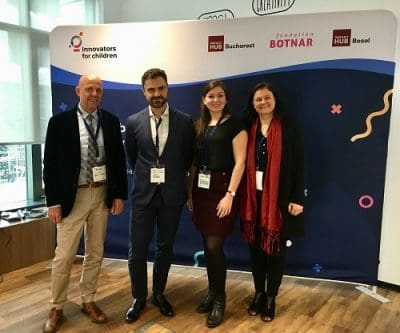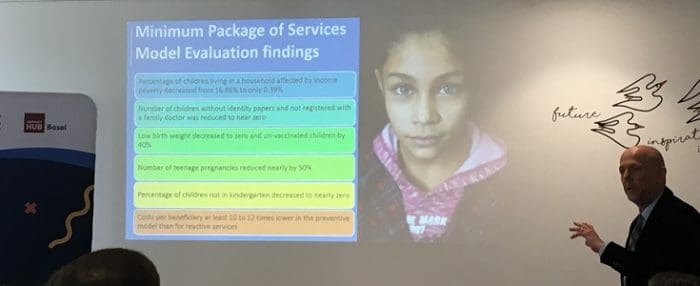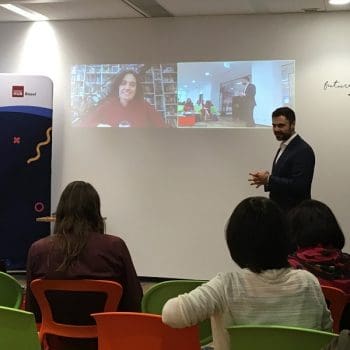On 09 April, Impact Hub Bucharest, (one of) our acronym twin(s), hosted a joint-conference on innovation in children’s public health in Romania, with speakers from UNICEF, Vodafone Foundation, and local organizations. We were there, and want to bring you behind-the-scenes insight.
41.7% of Romanian children are at risk of poverty and/or social exclusion (higher than EU average of 24.5%), and 40% are functionally illiterate by age 15. It’s easy to sit in Switzerland and talk about these issues on a macro-level, but real impact can only be made when sitting and listening to these stories in person. Larissa Rihm, Impact Hub Basel’s Marketing and Communications Lead, attended the Innovators for Children Conference in early April, so I decided to summarize some of her observations.

The event started with a keynote by Pieter Bult, representing UNICEF and Fondation Botnar, addressing the current issues in healthcare in Romania – a shortage of trained professionals, discrimination, and inefficiency, to name a few. Cost-effective and sustainable solutions proposed would make use of globally-available technology to reach out and deliver basic health services to vulnerable populations in Romania. These ideas were included in a “Minimum Package of Services” model, which aimed to train multi-disciplinary teams and provide integrated services to all aspects of a child’s life – for example, school counselors, social workers, and community nurses. Results from this study showed a 50% reduction in teenage pregnancy, and the percentage of children living under income poverty reduced to 0.39% in the 40,000 households tested. To scale-up, multi-stakeholder involvement will be required, so the public and private sectors will need to work together to achieve a better health system.

The panel following included experts in social challenges for children. Ramona Gotteszmann from non-profit Concordia mentioned that children are not receiving adequate education and social services are under-financed, leading to higher youth poverty levels and lack of social cohesion. Offering social support for at-risk youth can change their contribution to society. Angela Galeta from the Vodafone Foundation in Romania discussed the importance of sufficiently-supported partners and post-project impact – long-term results are limited if partners are only staffed with volunteers, and have no follow-up after social projects are run. Ana Costache from social help association Carusel addressed how raising awareness of children’s rights helped parents adapt what resources their children were receiving.

A second panel followed after a networking lunch. Stefan Vionea from MagiCamp, a one-week social inclusion camp for children, detailed his learnings as an entrepreneur. MagiChat, a new offer, allowed participants to interact with technology and health services (like therapists) directly, by writing to a child-friendly animation. Cristina Grigore from the Parents Foundation, an online support platform, mentioned the hesitation of parents to rely on technological solutions for health issues. It is common, for example, for parents to try and solve their children’s illnesses themselves, without outside help. Creating a platform for parents that offers advice and answers any open questions can be life-saving.

A second keynote closed the event, with talks from local changemakers. Francesca Fideli from Fight the Stroke, a social business around the topic of infant cerebral palsy, introduced the platform Mirrorable. Mirrorable is a tele-rehabilitation platform that uses friendly figures, like magicians, to help children with motor disabilities and educate them on their capabilities. This example demonstrated that innovation is also more widely accessible than it may seem.

Lucian Gramescu from Impact Hub Bucharest concluded the day with his thoughts on the role of sustainable businesses in promoting education and social goals. Having ambition, communicating effectively, and understanding the issue are key requirements for success. When working to advance children’s health, everyone needs to be involved – such issues can never be solved if stakeholders work against each other. Wise words, in my opinion.
Impact Hub Basel, with our partner Fondation Botnar, have already taken steps to do our part in addressing public health issues with innovation, and we hope our members will continue to support us on our journey. Feel free to share ideas with us, or follow-up on any of these projects mentioned, at our next event!
Caroline Steiblin
